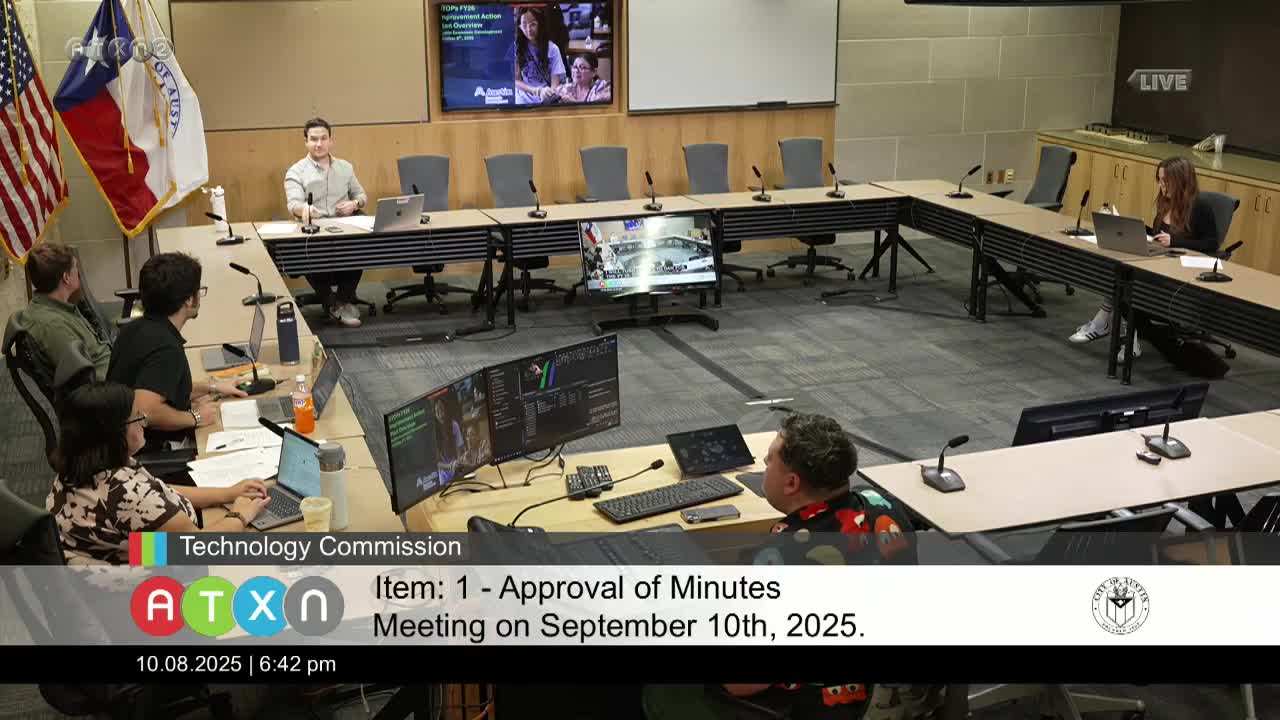Technology Commission backs GTOPS FY‑26 plan to standardize core awards and tighten review process
Get AI-powered insights, summaries, and transcripts
Subscribe
Summary
The Technology Commission voted unanimously to endorse staff’s option to standardize GTOPS core awards and make procedural changes to the grant review and contracting process for FY‑26, aiming to reduce administrative delays and increase oversight.
The Technology Commission voted unanimously Oct. 8 to endorse staff’s recommended direction for the FY‑26 Getting to Opportunities (GTOPS) grant program, moving to a model with larger, standardized core awards and several procedural changes intended to reduce contracting delays.
Commissioners approved the staff-preferred “option A,” which sets standardized core awards and reallocates the mini and capacity award pools. Dan Martinez, who presented the item as part of Austin Economic Development, said staff were “actually looking to make adjustments to the award allocations for GTOPS core mini capacity” to reduce the workload created by negotiating many different contract sizes.
The change approved by the commission would, under staff proposals, allocate eight $40,000 core awards, six $10,000 mini awards and eight $2,500 capacity awards. Martinez told commissioners the standardized award sizes are intended to reduce back-and-forth exhibit negotiations during contracting and get funds to recipients earlier in the year.
Why it matters: staff said the program’s contract workload and new grant-management portal delays pushed many payments late in the year, sometimes close to the city fiscal-year deadline. Jesse Rodriguez, GTOPS program manager, said standardizing award sizes and tightening procurement steps would “help us focus” and allow staff more bandwidth to audit and oversee award performance.
Staff also proposed operational changes to the GTOPS process. Major items described in the presentation and included in the action plan were: - discontinuing printed review binders and seeking cost- and time-saving alternatives; - increased staff oversight of the reviewer Q&A process and sitting in on panels to reduce duplication and so-called “group think;” - an application review tutorial for panelists; - replacing scheduled public “office hours” with more flexible one-on-one appointments; - aligning application and contracting timelines across pathways to reduce end-of-year delays; - adding Spanish-language assistance on mini and capacity application materials; - adding a required field for city vendor registration numbers on applications to prevent late payment delays; - setting a formal protest window (one week after award notifications, plus one week to adjudicate protests); and - adding clearer guidance in the applicant guide, including requiring the GTAS boilerplate contract be reviewed before application, guidance on generative AI use in applications, and a reminder that application materials are subject to public information requests.
Commissioners pressed staff on whether larger standardized awards would unduly reduce the number of organizations funded. Martinez acknowledged the tradeoff, saying the options would reduce the total number of awards compared with the prior year but argued that “deeper impact funding” to fewer organizations could have greater long-term effect.
Assistant Director Annie (Assistant Director, Austin Economic Development) and Rodriguez said the staff recommendation is option A. Rodriguez said one of the biggest administrative savings of option A is removing the need to renegotiate award sizes during contract development: “whatever you request is what you would actually get.”
The commission approved the recommendation by voice vote after a motion by Commissioner Steven Apodaca and a second by Commissioner Milena Privek; the recorded vote was unanimous of commissioners present. The commission asked staff to return with implementation details, to continue outreach to increase reviewer recruitment, and to use freed administrative capacity to increase performance oversight.
Commissioners and staff also described existing performance-reporting practices: core awards have negotiated performance measures and require midterm and closeout reports; mini awards have lighter reporting requirements; capacity awards are intended for organizational capacity and do not have formal performance metrics. Staff said they hope reduced contracting volume will allow more frequent auditing or on-site checks where needed.
The commission’s motion and unanimous vote adopt the direction described in the staff action plan; no ordinance or funding code change was enacted by the commission at this meeting.
What’s next: staff will implement the new application timelines, update the Applicant Guide and boilerplate requirement language, set the protest window, and return to the commission with final implementation materials and contracting timelines.
